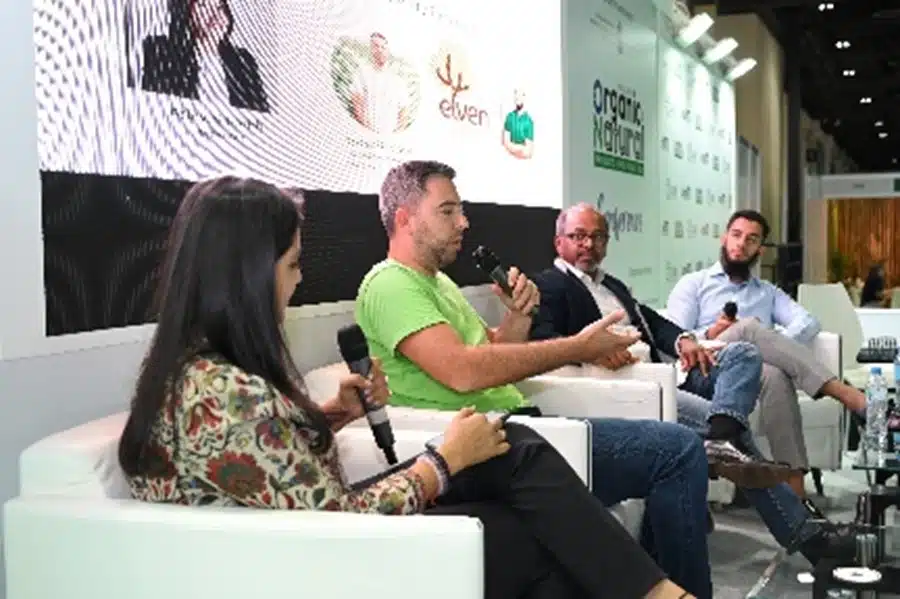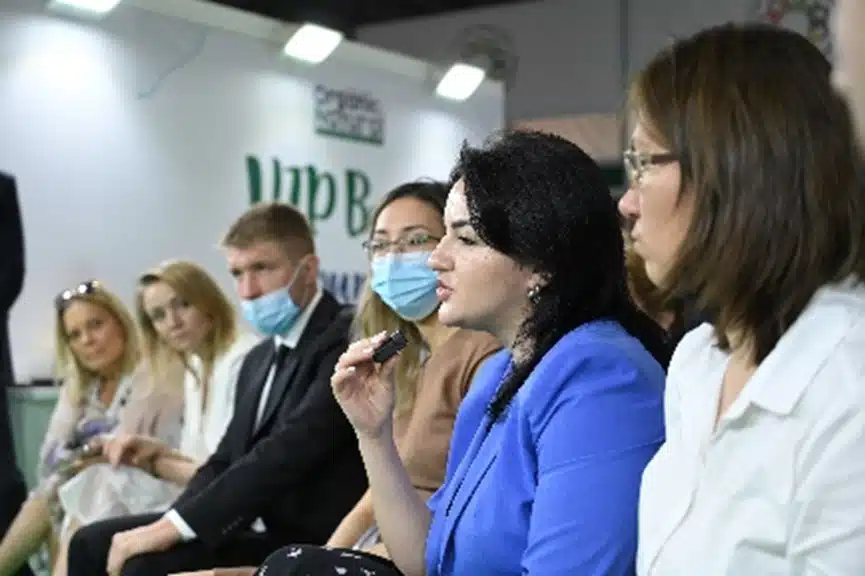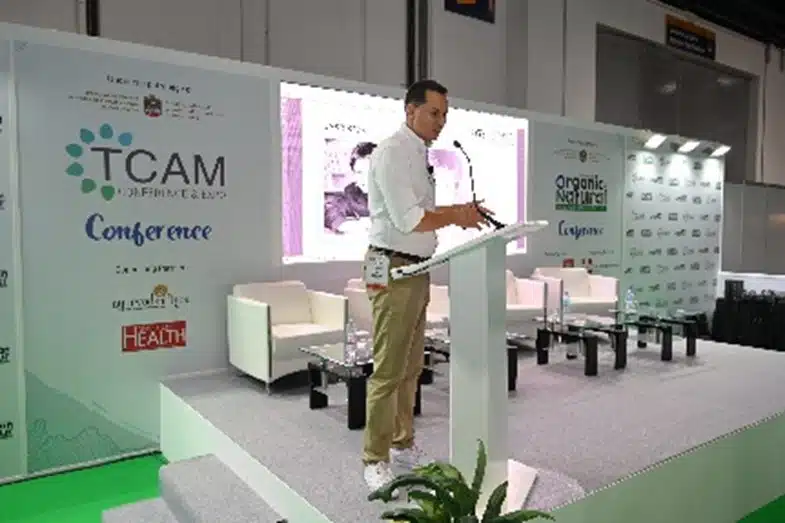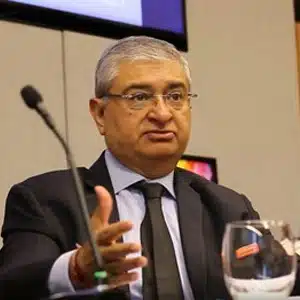16 – 18 November 2026 | 10am – 5pm
Dubai World Trade Centre
16 – 18 November 2026 | 10am – 5pm | Dubai World Trade Centre
ORGANIC INDUSTRY CONFERENCE
2022 December 13th – 15th,
10 AM – 5 PM
The Organic & Natural Products Expo has been bringing the business community together for the last 20 years through online platforms and at the annual face-to-face event in Dubai every December.
The Organic and Natural Conference, taking place across the 3 days will feature a combination of presentations, panel discussions, fireside chats on topics such as Organic and Natural Trends for 2023, Vegan, free from and plant-based products, clean beauty and natural cosmetics, Tea & Coffee, Honey, nutraceuticals, supplements & probiotics as well as Sustainable living and best environmental practices.
The organic and natural conference is the only platform in the Middle East for distributors, retailers, HORECA experts, wholesalers, and exporters to come together and discuss the latest trends, updates on product certifications and labelling, export, and retail strategies and gain first hand insights into the region’s organic and natural market.
Do not miss this once-a-year opportunity to hear from the region’s leading organic and natural experts LIVE & UNFILTERED.



2022
15+
30+

Why Attend ?
- Food & Beverage
- Tea & Coffee
- Honey
- Vegan, plant based and free from
- Fresh produce
- Superfoods
- Dairy
- Beauty, cosmetics, skincare, and haircare
- Nutraceuticals, supplements & probiotics
- Mom, baby & child
- Sustainable living & environment
- Organic & sustainable farming

Who Should Attend?
Attend the Organic and Natural Conference 2022 to:
- Discover the latest Organic and Natural trends in the Middle East and what the future holds for the sector
- Hear from C-suite leaders from across the region speak about retail, distribution, and re-export strategies
- Connect with exporters who’re keen on expanding into the Middle East to source unique products
- Get an exclusive opportunity to network with organic and natural industry professionals across the globe to be a part of the organic community
Stay ahead of the market by predicting and debating upcoming product trends, innovation and unique insights into the future of the organic and natural industry
Key themes to be discussed
Organic and Natural Trends for 2023
Vegan, plant based and free from
Fresh Produce
Natural, raw honey
Superfoods
Halal economy and opportunities
Specialty Tea & Coffee
and beverages
Mom, baby & child
Organic dairy
Beauty, cosmetics, skin and haircare
Sustainable living & environment
Nutraceuticals, supplements and probiotics
2022 PANEL DISCUSSIONS
Making business with Russia nowadays
10:30 AM – 11:00 AM

Dmitry Polyakov
General Director, RusGlobalExport
Specialty Coffee & Tea – What’s causing the major stir in the Middle East?
11:00 AM – 11:40 AM
The stage is set in the Middle East for coffee and tea growers, with the annual forecasted growth at 7.5% until 2025. Currently the market for speciality tea and coffee in the UAE alone is valued at $705 million. In the GCC close to 3.4 billion cups of coffee are consumed daily. With beverages being a Middle Eastern favourite, let’s take a closer look at beverage trends in the MENA.
Trends, consumer habits and brews – What’s hot in Middle East’s beverage market?
For a vast majority of us here in the Middle East, the day doesn’t begin without a strong cup of tea or coffee. However, as consumer habits and beverage enthusiasts turn healthier, it’s important that producers, brands and cafes shift focus to meet changing demand. There’s also been a shift in brewing methods to manual brewing being increasingly preferred over other conventional methods.
How are beverage preferences changing in the Middle East?
- Tracking a consumer shift from carbonated lines to fusion lines as people love experimenting and trying new combinations
- While a lot has changed in the post pandemic era, markets for beverages have remained resilient, how can suppliers find their niche
- Growing trend of sustainability across packaged coffee beans, tea leaves to cater to the conscious consumer
Ecological Agriculture and the Agro-Ecosystem
12:00 PM – 12:40 PM
Our problem today is not one of producing more food, but producing food where it is most needed and in a way that respects nature. The current industrial agriculture system fails to deliver this. Meanwhile, the planet is suffering considerably. We are over-exploiting resources and reducing soil fertility, biodiversity, and water quality. Toxic substances are accumulating in our surroundings. Levels of waste are growing. And all this is occurring in the context of climate change and increased pressure on the Earth’s diminishing resources. Our current agriculture system depends on the use of vast amounts of chemicals, as well as fossil fuels. This agriculture system pollutes and harms the water, the soil, and the air. It contributes massively to climate change and harms biodiversity and the wellbeing of farmers and consumers.
Building the strengths of natural ecosystems into agroecosystems, purposely distributed to produce food and fiber
What strategies is Middle East adopting towards sustainable agriculture?
- Using practices that (a) grow healthy plants with good defense capabilities (b) stressing pests and (c) enhancing populations of beneficial organisms
- Enhanced habitat management both above the ground and in the soil
- Discussing practices that are well known such as intensive use of cover crops or reduced tillage

Dr. Abdelaziz Abdelkhalek
How to optimise your tech stack for the benefit of the environment?
01:00 PM – 01:30 PM

Saf Hussain
Founder, Smart Saas
Organic Agriculture Policy in the Kingdom of Saudi Arabia: Present status and Future Prospects
02:00 PM – 02:40 PM
During the past years, Saudi Arabia’s attention is increasingly directed towards sustainable agriculture and environment friendly farming practices. In 2005, the Organic Agriculture has been adopted by the Ministry of Environment, Water & Agriculture in order to support the organic sector. A functional institutional framework was established by the government with the establishing of the Department of Organic Production as competent authority within the Ministry of Environment, Water and Agriculture; the Saudi Organic Farming Association as a private and independent non-profit organization incorporating all private stakeholders related to organic agriculture under one umbrella; and the National Center of Organic Agriculture as a research institution
What does the future look like for Organic and Natural in Saudi Arabia?
- Discussing Saudi Arabia’s ambitions goal of boosting the production of organic food
- The massive impact of the application of the Executive Action Plan of Organic Agriculture Policy to enhance development of organic sector
- Boosting supply chain, marketing, supporting research and organic inputs and sharing responsibilities amongst all stakeholders

Eng. Mustafa Abdulbaqi Alwi AlArab
Department of Organic Agriculture – Ministry of Environment, Water and Agriculture in the KSA.
Pure, Raw Honey – MENA, the new hub for bee business
03:00 PM – 03:50 PM
Honey is increasingly replacing sugar across the Middle Eastern palate. Café’s, hotels and restaurants are reporting trends where people are using honey for their coffee and tea and why not? The usage of honey in the region goes way back in time and holds immense religious and culture, but it’s also the anti-inflammatory, anti-bacterial and medicinal properties that’s driving people to re-adopt to what is increasingly being known as “liquid gold”. However, with natural commercial honey flooding the market, what place will pure, raw honey have in the Middle East?
Organic honey reclaims its relevance and significance across the Middle East
It’s no surprise that between 2020-2026 the raw honey market in the UAE alone is said to grow at a CAGR of 12.2%. Honey is considered as a curative, beauty aid and as an anti-bacterial agent for decades now. With consumers being more conscious today than ever coupled with government support to apiaries and beekeepers, honey is said to rule the region’s superfood list.
Organic honey has proven to prevent, cure and even boost immunity, what does the future look like?
- Organic honey production in UAE – production, certification and distribution
- Infusion honey through jams and jelly to promote it’s consumption as a breakfast delicacy and amongst kids
- The importance of innovation through the introduction of unique flavour profiles to attract a wider consumer base
No longer a fad - Superfoods puts healthy back into diets
04:10 PM – 04:50 PM
Superfoods are nothing new to the Middle East, they need no introduction. From weight-loss to aiding women with childbirth or even boosting immunity, Middle Eastern superfoods pack a super punch. Along with the Middle East, superfoods from South America are seeing demand go through the roof.
Superfoods rise fast to become a staple for the Middle East
Whether it’s quinoa, dates, acai, kombucha, lemon grass or even avocados, superfoods are flying off the shelves. Filled with nutrients such as vitamins, minerals and antioxidants and with minimal calories, superfoods help in reducing the risk of heart disease, cancer, respiratory diseases etc. However, given that most of the superfoods are relatively low in the value chain of the food production, it becomes critical for brands to draw up a well thought out plan to tap into the potential in the region.
The rise of “Gen I”, and how are they driving the consumption of superfoods across the GCC?
- Tracking the growth of the superfoods segment in the Middle East so far and discussing opportunities for further scope of expansion to reduce risk of diseases, obesity and diabetes
- Branding, packaging, and distribution – are these the only key elements to drive superfood sales or do companies need to go over and above
- Discussing upcoming and future trends such as the rise of “Salicornia” that serves as a replacement to salt and acts as micronutrients












